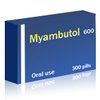
ETIBI (MYAMBUTOL) INDICATIONS
Etibi is used for treating tuberculosis (TB) infections of the lung along with other medicines. Etibi is an antibacterial agent. It works by stopping the growth of TB cells, which results in cell death.
ETIBI (MYAMBUTOL) INSTRUCTIONS
Use Etibi as directed by your doctor.
- Take Etibi with or without food at the same time each day.
- Do not take antacids containing aluminum hydroxide for at least 4 hours after taking Etibi.
- If you miss a dose of Etibi, take it as soon as possible. If it is almost time for your next dose, skip the missed dose and go back to your regular dosing schedule. Do not take 2 doses at once.
Ask your health care provider any questions you may have about how to use Etibi.
ETIBI (MYAMBUTOL) STORAGE
Store Etibi at room temperature, between 68 and 77 degrees F (20 and 25 degrees C), in a tightly closed container. Store away from heat, moisture, and light. Do not store in the bathroom. Keep Etibi out of the reach of children and away from pets.
ETIBI (MYAMBUTOL) MORE INFO:
Active Ingredient:Ethambutol hcl.
Do NOT use Etibi if:
- you are allergic to any ingredient in Etibi
- you have inflammation of the optic nerve (optic neuritis), you cannot determine if you are having vision changes, or you are unable to report vision changes to your doctor or health care provider.
Contact your doctor or health care provider right away if any of these apply to you.
Some medical conditions may interact with Etibi. Tell your doctor or pharmacist if you have any medical conditions, especially if any of the following apply to you:
- if you are pregnant, planning to become pregnant, or are breast-feeding
- if you are taking any prescription or nonprescription medicine, herbal preparation, or dietary supplement
- if you have allergies to medicines, foods, or other substances
- if you have gouty arthritis or are having a gout attack
- if you have cataracts, recurrent eye inflammation, or eye problems caused by diabetes (diabetic retinopathy)
- if you have kidney or liver problems.
Some medicines may interact with Etibi. However, no specific interactions with Etibi are known at this time.
Important safety information:
- Etibi may cause dizziness. Do not drive, operate machinery, or do anything else that could be dangerous until you know how you react to Etibi. Using Etibi alone, with certain other medicines, or with alcohol may lessen your ability to drive or perform other potentially dangerous tasks.
- It is important to use Etibi for the full course of treatment. Failure to do so may decrease the effectiveness of Etibi and increase the risk that the bacteria will no longer be sensitive to Etibi and will not be able to be treated by this or certain other antibiotics in the future.
- Etibi is effective only against certain types of bacteria. It is not effective for treating viral infections (eg, the common cold).
- Long-term or repeated use of Etibi may cause a second infection. Your doctor may want to change your medicine to treat the second infection. Contact your doctor if signs of a second infection occur.
- Lab tests, including liver and kidney function tests, complete blood cell counts, and vision tests, may be performed to monitor your progress or to check for side effects. Be sure to keep all doctor and lab appointments.
- Etibi should not be used in children younger 13 years. Safety and effectiveness in this age group have not been confirmed.
- Pregnancy and breast-feeding: If you become pregnant, discuss with your doctor the benefits and risks of using Etibi during pregnancy. Etibi is excreted in breast milk. If you are or will be breast-feeding while you are using Etibi, check with your doctor or pharmacist to discuss the risks to your baby.
All medicines may cause side effects, but many people have no, or minor, side effects.
Check with your doctor if any of these most common side effects persist or become bothersome:
Appetite loss; disorientation; dizziness; general body discomfort; headache; nausea; stomach upset or pain; vomiting.
Seek medical attention right away if any of these severe side effects occur:
Severe allergic reactions (rash; hives; itching; difficulty breathing; tightness in the chest; swelling of the mouth, face, lips, or tongue); chest pain or tightness; confusion; dark urine; easy bruising or bleeding; fever, chills, or sore throat; hallucinations; joint pain, swelling, or severe tenderness; lower back pain; numbness or tingling of the hands, legs, or feet; severe stomach pain; swollen glands in the neck or armpit; vision loss or other vision changes; yellowing of the skin or eyes.
This is not a complete list of all side effects that may occur. If you have questions about side effects, contact your health care provider.